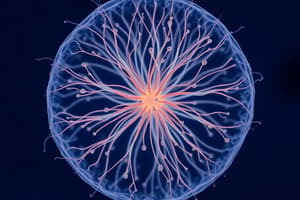Podcast
Questions and Answers
Which process refers to the production of offspring without the fusion of gametes?
Which process refers to the production of offspring without the fusion of gametes?
- Asexual reproduction (correct)
- Fertilization
- Sexual reproduction
- Budding
What is the process where offspring are produced from the fusion of male and female gametes during fertilization?
What is the process where offspring are produced from the fusion of male and female gametes during fertilization?
- Sexual reproduction (correct)
- Binary fission
- Asexual reproduction
- Vegetative propagation
Which stage of respiration occurs in the cytoplasm of cells?
Which stage of respiration occurs in the cytoplasm of cells?
- Oxidative phosphorylation
- Glycolysis (correct)
- Krebs cycle
- Anaerobic respiration
What is the zygote that forms after fertilization in humans?
What is the zygote that forms after fertilization in humans?
In which organisms does vegetative propagation occur?
In which organisms does vegetative propagation occur?
Which process involves the decarboxylation of pyruvate to produce ATP, NADH, and FADH2?
Which process involves the decarboxylation of pyruvate to produce ATP, NADH, and FADH2?
What is the main purpose of oxidative phosphorylation in cellular respiration?
What is the main purpose of oxidative phosphorylation in cellular respiration?
Which stage of cellular respiration involves the breakdown of glucose molecules into two molecules of pyruvate?
Which stage of cellular respiration involves the breakdown of glucose molecules into two molecules of pyruvate?
What is the impact of respiration on cellular processes, as mentioned in the text?
What is the impact of respiration on cellular processes, as mentioned in the text?
Why is understanding reproduction and respiration essential for Class 10 Biology exams?
Why is understanding reproduction and respiration essential for Class 10 Biology exams?
Flashcards are hidden until you start studying
Study Notes
Biology Class 10: Exploring Reproduction and Respiration
Reproduction
Reproduction is a fundamental biological process that ensures the survival and continuation of species. In Class 10 Biology, students learn about the various modes of reproduction, including asexual and sexual reproduction, and their importance in different organisms.
- Asexual Reproduction: This refers to the production of offspring without the fusion of gametes (sperm and egg cells). Examples include vegetative propagation in plants, budding in fungi, and binary fission in bacteria.
- Sexual Reproduction: This is the process where offspring are produced from the fusion of male and female gametes during fertilization. In flowering plants, the well-known example is the production of seeds that grow into new plants.
- Sexual Reproduction in Humans: Humans reproduce sexually through the fusion of a sperm and an egg cell during fertilization. The zygote that forms after fertilization then grows and develops into an embryo, which eventually becomes a fetus in the womb.
Respiration
Respiration is a vital process that enables living organisms to produce energy in the form of ATP. In Class 10 Biology, students learn about cellular respiration, which occurs in three stages: glycolysis, the Krebs cycle, and oxidative phosphorylation.
- Glycolysis: This is the initial stage that occurs in the cytoplasm of cells. During glycolysis, glucose molecules are broken down into two molecules of pyruvate, generating ATP and NADH.
- The Krebs Cycle (or Citric Acid Cycle): This takes place in the mitochondrion and involves the decarboxylation of pyruvate molecules to produce ATP, NADH, and FADH2.
- Oxidative Phosphorylation: During this stage, the electron transport chain and chemiosmosis occur in the mitochondria. As electrons are passed down the chain, protons are pumped across the mitochondrial inner membrane, creating a gradient that drives ATP synthesis.
Application of Reproduction and Respiration Concepts
Understanding reproduction and respiration is essential for answering questions in Class 10 Biology exams and for acquiring a strong foundation in the subject. Students should also be aware of the following concepts:
- Reproduction in different organisms (e.g., plants, animals, bacteria, fungi)
- Processes during sexual reproduction (e.g., fertilization, pollination, seed dispersal)
- The role of hormones in the regulation of sexual reproduction (e.g., gonadotropins, sex hormones)
- The relationship between cellular respiration and energy production
- The impact of respiration on cellular processes (e.g., cellular pH, oxidative stress)
By mastering these concepts, students will not only excel in their Class 10 Biology exams but also develop a strong understanding of life processes that will serve them well in their future studies in the field of biology.
Studying That Suits You
Use AI to generate personalized quizzes and flashcards to suit your learning preferences.



